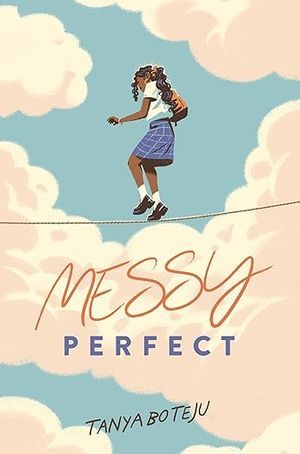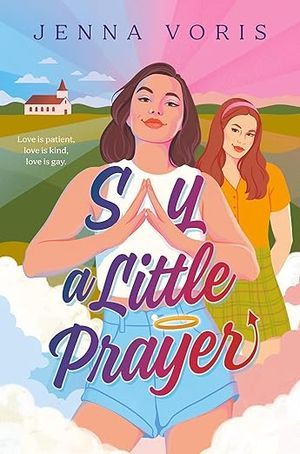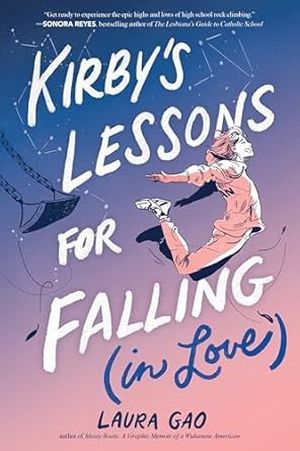One of the quips I see pop up every single week in response to book banning news is that we–meaning the folks who are actively working to ensure access to books remains unchanged–should be challenging the Bible based on the same criteria used to judge and ban other books. This is, of course, not the right thing to be doing. Not only is it banning for the sake of banning, which defeats the point of pushing back against book bans, but it’s also deeply disrespectful to the real marginalized people whose lives are being challenged by these book bans.
Many of the very people of color and queer people seeing their stories held up as “inappropriate” are themselves people who believe in any number of Christian denominations and, thus, are themselves using the Bible. Indeed, encouraging people of faith to speak up about how book bans impact their freedom of religion is crucial right now.
It’s been with deep interest that I’ve noted several YA books published so far this year that dive into the tricky territory of being a queer person of Christian faith. I wouldn’t say this is a trend this year because saying so suggests that it’s a new issue. Instead, I’d say it’s a topic that simply has not shown up as much in YA as one might anticipate, especially as the YA landscape has broadened and become more inclusive. If anything, it’s a microtrend in 2025, and it’s likely a topic we’ll see continue to grow over the next few years. It would be impossible not to, especially as we live through an era where an attack on one freedom guaranteed in the First Amendment is an attack on all the freedoms it guarantees.
I talked about a couple of these books on the Hey YA podcast last month, and you’ll see those mentioned below. In the course of a recent conversation about the books, I mentioned that I picked up a work of adult nonfiction out this month that has had me thinking a lot about the role religion has played in my own life. That book is Church Camp: Bad Skits, Cry Night, and How White Evangelicalism Betrayed a Generation by Cara Meredith.
I attended a church camp many summers of my youth and loved it to bits and pieces. It was a place where I remember singing a lot of Christian songs, doing a lot of prayer, and listening to a lot of enthusiastic young adults talk about their personal journeys with Jesus, alongside spending countless hours swimming, playing capture the flag across a sprawling outdoor space, and making friends, some of whom I am still friends with today. Meredith’s book opened my eyes to this experience in a whole new way without minimizing what I took away from the experience. White Evangelicalism is at the root of book banning and targeted attacks on marginalized individuals right now in 2025. The threads of those beliefs were sewn into the minds of young people, like me, who attended Evangelical church camps in their youth. It is wild to remember how far back the start of today’s brutal attacks has been, and more, it’s been eerie to think that one contributing factor to my own peers spewing such hatred and bigotry was the very thing I myself found to be one of the highlights of summer: camp.
It’s an excellent read, and it’s one that is rooted in strong faith and belief. Whether or not you are religious, it’s the kind of book that might help further explain why sociopolitically we are where we are and why narratives like those in these recent and upcoming YA books about queerness and faith are so important to today’s young (and not so young!) readers.
Something to notice in each of the below books, too, is that they vary widely in their tone and approach. There’s humor here, just as much as there is deep contemplation and wrestling with what it means to be a queer person in a world where queer people are not welcome.
Gay The Pray Away by Natalie Naudus (June 4)Not all of the books in this roundup are about Christian followings being cults, though this one is, and it’s one that’s going to hold a mirror up to a lot of what today’s teens are seeing and experiencing. Valerie Danners was raised in a religious cult, which means she’s been subject to a fundamentalist homeschool routine since she was young. Finding a queer novel at the local library begins to throw everything she’s learned into question, though the book is hardly the biggest thing raising alarms in Valerie. She’s met a new girl in town named Riley, with who Valerie cannot spend enough time. She’s developing a lot of feelings, which she knows goes against everything her family and religious community have taught her. Now, Valerie must choose between her family or the chance at being who she truly is. |
Kirby’s Lessons for Falling (in Love) by Laura GaoKirby Tan was one of the best rock climbers in her school, even earning the nickname of Queen of Balance. But when she takes a fall and gets injured, she’s out of commission for the season. To get extra credit, Kirby finds herself working for the school newspaper. She’s not especially excited, but it is what it is. But when Bex Santos asks her to help with her astrology-based love advice column, Kirby’s not so sure she cares about the way the stars could help a Libra or a Capricorn find their one true love. The thing is, the more Kirby helps Bex with the column, the more Kirby begins to believe she and Bex are meant to be. Their romance might be budding–with or without the meddling stars–but Kirby knows that the relationship is challenged from the start. She has no idea how her family and her church will feel about her dating Bex. |

Messy Perfect by Tanya BotejuCassie Perera is a junior at St. Luke’s, and she’s always been a stellar student. As she’s starting the new year, she’s surprised to see her former best friend Ben back at St. Luke’s. He was bullied for being gay, and Cassie believes that she could have done more at the time to help him. So, she’s decided to be proactive this time around. Cassie has teamed up with the local public school to create an underground Gender and Sexuality Alliance. It’ll help Ben, maybe, while also really and truly being an opportunity for Cassie to become a little more honest about her own identity. But as Cassie’s new friends are helping her find who she truly is, she’s finding herself in a sticky spot of balancing her newfound freedoms and happiness with the responsibilities she feels she has to be a perfect daughter, perfect student, and perfect Catholic girl. |

Say a Little Prayer by Jenna VorisRiley left her church a year ago because it was not a welcoming place for a bisexual girl like her and because of how the church treated her sister when she got an abortion. So when Riley is sent to the principal’s office for smacking a girl who was talking poorly about her sister, she doesn’t anticipate being given the opportunity to avoid suspension by attending a church camp. She’ll take that option, partly because her best friend Julia will be there, too. But Julia’s dad is in charge of the camp, and Riley has no interest in repenting. Instead, she’s going to use the week-long camp to dive deep into the seven deadly sins. It might help her peers understand that life doesn’t need to be about strict piety to be good. There’s a hitch in the plan, though, and it’s a big one. Riley is falling for Julia and hard. |
Several years back, I wrote a piece about why watching the Shiny Happy People documentary is crucial for understanding today’s era of book censorship and regressive politics. I’m resharing it here, since it also adds more context to why books like these are appearing more frequently, why they’re centered around Christian faith, and why we will likely see more to come.
Source : 2025 YA Microtrend: Wrestling With Queer Identity and Religion











